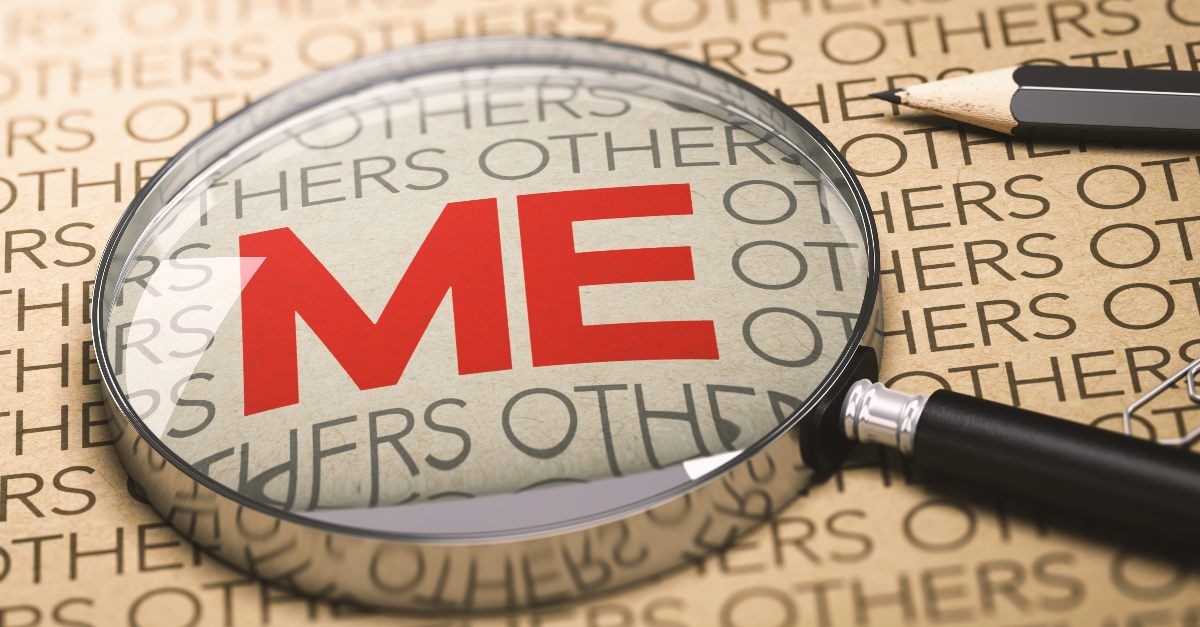
Perhaps you’ve heard the Greek myth from long ago — the extraordinarily handsome young man, Narcissus, so beautiful that people flocked to him in adoration. One day, Narcissus strolled by the river and grew thirsty, so he decided to stop and collect some water with his hands.
But when he knelt to take a sip, he caught a glimpse of his reflection in the water and grew so enamored with his own beauty that he became entranced.
Narcissus died there at the banks of that river — some say at his own hand, some say from falling into the water — so caught up in his own magnificence he could live no longer.
Have you ever met someone like this, so caught up in him or herself that their grandiose self-vision eclipses the rest of the world? Sometimes, this vision has to do with an inflated self-view about physical appearance, but often, it involves other traits, such as intelligence, artistic or athletic ability, or success.
Psychologists have named this sort of person a “narcissist,” after Narcissus — someone who has an excessive interest in or admiration of themselves.
Often, narcissists are accused of thinking the world revolves around them. They have an unreasonably high sense of their own self-importance and are excessively preoccupied with themselves and their own needs.
Next-level narcissists are diagnosed with what is called narcissistic personality disorder, with a spectrum of symptoms that can vary from slight to dramatic.
Narcissists can exhibit damaging behaviors that negatively affect those around them, and it can be difficult and even infuriating for those around them, harming romantic, familial, or professional relationships.
At first, a narcissist might seem like an ideal partner, charming and enthusiastically showering you with compliments, gifts, or other displays of affection. But soon, the “honeymoon period” ends, and you are left reeling, wondering if you did something wrong or what changed.
In reality, it’s simply that the narcissistic personality trait is revealing itself to you. However, this can also be difficult, both because some narcissists do not believe they are narcissistic or because they go to great lengths to conceal this trait, often making it seem as if you are the one with the problem, not them. If you are a Christian, or they are, it might be even more difficult to detect or address.
Here, then, are five telltale signs the person you love is a narcissist.
Photo Credit: ©Getty Images/OSTILL

1. They Lack Empathy
Most people can be selfish or struggle to put others before themselves. God knows how hard this can be for us.
Perhaps that’s why he urged us to be “born again” (John 3:3), and to “do to others what you would have them do to you” (Matthew 7:12).
Empathy is a hallmark of those who follow Christ. It involves the ability to understand and share the feelings of another, to be aware of and be sensitive to the thoughts and experiences of another person.
The phrase “put yourself in someone else’s shoes” comes to mind — it’s the ability to identify with and then, in turn, treat others the way we would want to be treated.
However, narcissists are either unable or unwilling to have such empathy for others. They either do not care about someone else’s plight or cannot muster the ability to relate to another.
Incredibly self-absorbed, they seem not to have any real desire for true, give-and-take emotional intimacy. They want to be heard and understood by another, but they do not offer this in return.
An example of one such unfeeling and callous person in the Bible is Nabal, husband of Abigail, found in 1 Samuel 25. While in the wilderness, King David treated Nabal’s servants and flock with kindness and care.
When David asked for food and other provisions during a time of need, however, surly and unempathetic Nabal refused, asking, “Who is this David? Who is this son of Jesse? Many servants are breaking away from their masters these days. Why should I take my bread and water, and the meat I have slaughtered for my shearers and give it to men coming from who knows where?” (1 Samuel 25:10-11).
If your loved one refuses or cannot seem to understand someone else’s experiences or difficulties, this is one sign they could well be a narcissist.
Photo Credit: ©GettyImages/Jcomp

2. A Sense of Entitlement
Many people feel entitled to things in life. Children might feel entitled to new clothing, toys, or cell phones without realizing these are gifts from people who love them.
Employees might feel entitled to special perks at the office without realizing this is a kindness their manager offers out of care.
A narcissist, however, generally seems to feel like they are entitled to things just because they want them. Often, they expect others to heed their desires.
They might get upset if corrected or reprimanded, and they feel they need to be treated as if they are more special, somehow than anyone else.
Deep down, they believe they are uncommon, rare, and worthy of so much more than anyone else. They expect the best treatment no matter what, just because. Sometimes, they think the rules don’t apply to them and that they are superior to others.
The Bible shows us Jesus modeled the opposite of this, and we should, too. Jesus washed his disciples' feet (John 13:1-5) and said he came to serve rather than be served (Matthew 20:28). He urged us to be humble and not to take the best seat or place of honor at the table (Luke 14:7-11).
Entitlement almost cost Naaman his chance for healing from leprosy in 2 Kings 5. Naaman asked Elisha to heal him, and Elisha sent word that Naaman should go wash seven times in the Jordan River.
Naaman was disgusted at what he presumed was such common advice, stating, “I thought that he would surely come out to me and stand and call on the name of the Lord his God, wave his hand over the spot and cure me of my leprosy.
Are not Abana and Pharpar, the rivers of Damascus, better than all the waters of Israel? Couldn’t I wash in them and be cleansed?” (2 Kings 5:11-12). But his men advised him to try it, so Naaman did — and was healed and much appreciative.
If your loved one feels like they are entitled to special treatment or that they stand somehow outside the rules others must obey, this is a sign they could be a narcissist.
Photo Credit: ©iStock/Getty Images Plus/Paul Bradbury

3. They Must Be the Star
Narcissists often don’t just want to shine — they feel they absolutely need to be the center of attention. In fact, if they feel ignored or if someone else gets more attention than they do, they might get unreasonably upset.
They seem to crave admiration and constantly fish for compliments and adoration. They want to know what others think of them. Often, this is because deep down, they are plagued with self-doubt, self-criticism, or a pervading sense of emptiness and low self-esteem.
Other times, they genuinely have such a high opinion of themselves that they simply believe they are superior to others — deserving of such attention.
They may gossip about people they envy, or make up reasons why that person is successful, attractive, etc. (“He only looks good because of all that Botox.”)
Saul, the first king of Israel, is considered a narcissist who needs to be the center of attention. Even though he was king, he felt jealous of David, the young shepherd who played the lyre for him and who had slain the giant Goliath for him.
When he’d send David out on conquests, the Lord would bring David much success. Saul grew deeply envious.
As the Bible tells us, “When the men were returning home after David had killed the Philistine, the women came out from all the towns of Israel to meet King Saul with singing and dancing, with joyful songs and with timbrels and lyres.
As they danced, they sang: ‘Saul has slain his thousands, and David his tens of thousands.’ Saul was very angry; this refrain displeased him greatly. ‘They have credited David with tens of thousands,’ he thought, ‘but me with only thousands. What more can he get but the kingdom?’ And from that time on Saul kept a close eye on David” (1 Samuel 18:6-9).
If your loved one is a narcissist, they might desperately crave attention and need to be first or the best. They might feel slighted and filled with envy and anger if they are not. They want to feel appreciated, praised and admired. They crave validation from others.
Photo Credit: ©Getty Images/Khosrork

4. Bragging, Bragging, and More Ragging
Narcissists often brag or exaggerate their accomplishments and come across as arrogant both in behavior and attitude. They may constantly talk about their physical appearance, successes, romantic conquests, or money.
They might also talk about how much others flirt with them. They typically see themselves as superior to others and might become rude when they don’t receive the treatment they think they deserve. They may speak or act abusively or rudely, demeaning those they deem to be inferior.
They might also overestimate their capabilities or hold themselves to ridiculously high standards.
They might also be snobbish or condescending, believing they should associate only with those they see as “worthy.”
As well, they might use others for their own gain, whether consciously or unconsciously. They might also make friends with people who they believe could increase their status in some way.
Bragging is not a Christian value. In Jeremiah 9:23-24, the Lord says, “Let not the wise boast of their wisdom or the strong boast of their strength or the rich boast of their riches, but let the one who boasts boast about this: that they have the understanding to know me, that I am the Lord, who exercises kindness, justice, and righteousness on earth, for in these I delight.”
Proverbs 27:2 urges, “Let someone else praise you, and not your own mouth; an outsider, and not your own lips.”
An example of sinful braggers in Scripture is the self-righteous Pharisees. Jesus told us not to be like them but rather to be humble and to brag about the Lord, not ourselves.
If your loved one talks constantly about their achievements, talents, or good looks, they could well be a narcissist.
Photo Credit: ©iStock/Getty Images Plus/Olivier Le Moal

5. Exploitation and Manipulation
A narcissist is constantly looking out for their own best interest, thinking of their needs first. Often, they are friends with someone because of what that person can do for them. For example, they marry someone with a good reputation so they can also be seen as good and worthy.
They befriend someone who can give them rides to and from places, or get them admission to their fancy club or a discount at the store where they work. Often, they use people for their own gain.
Narcissists also might try to keep people at a certain distance in order to maintain control over the relationship. “I’ll call you,” they might say to keep the upper hand.
Manipulators often use lies and deceit to control and influence others. In Genesis 27:1–29, the Bible shows us how Isaac’s son Jacob unfairly manipulated his brother and his father to get the eldest son’s birthright and blessing. Later, Jacob repented and sought to walk on the right path with God.
If your loved one is constantly manipulating a situation or other people for their own gain, this is another sign they could be a narcissist.
Narcissists, as well as those with narcissistic personality disorder, might not think they have a problem, and they often do not seek treatment.
You can encourage them to talk to a trusted mental health professional to address these issues. You also might benefit from speaking with someone yourself, as loved ones of narcissists often are victims of emotional or physical abuse, gaslighting, and other issues.
Narcissism is among the issues that plague humans who are slaves to sin and slaves to the flesh. But we can take heart in knowing that Jesus sets the captives free (John 8:34-35). As Christians, the Holy Spirit works in us and helps us become better and more like Christ. This process is called sanctification.
While we never become perfect, we can become holier, better, and more like Christ over time. Amen, and thanks be to God.
For further reading:
What Happens When Narcissism Enters the Church?
What Bible Advise for Handling Narcissistic Behavior?
How Should Christians Respond to Narcissistic People?
Photo Credit: ©iStock/Getty Images Plus/Feodora Chiosea

Originally published Thursday, 07 December 2023.

Was this resource helpful? Add Christianity.com as a trusted source for Biblical content.
